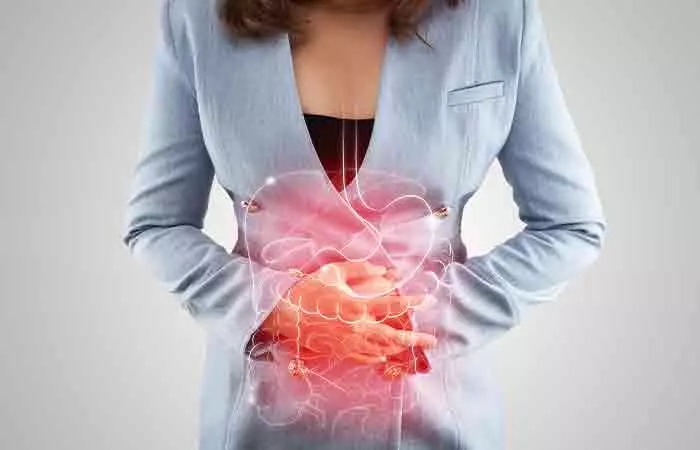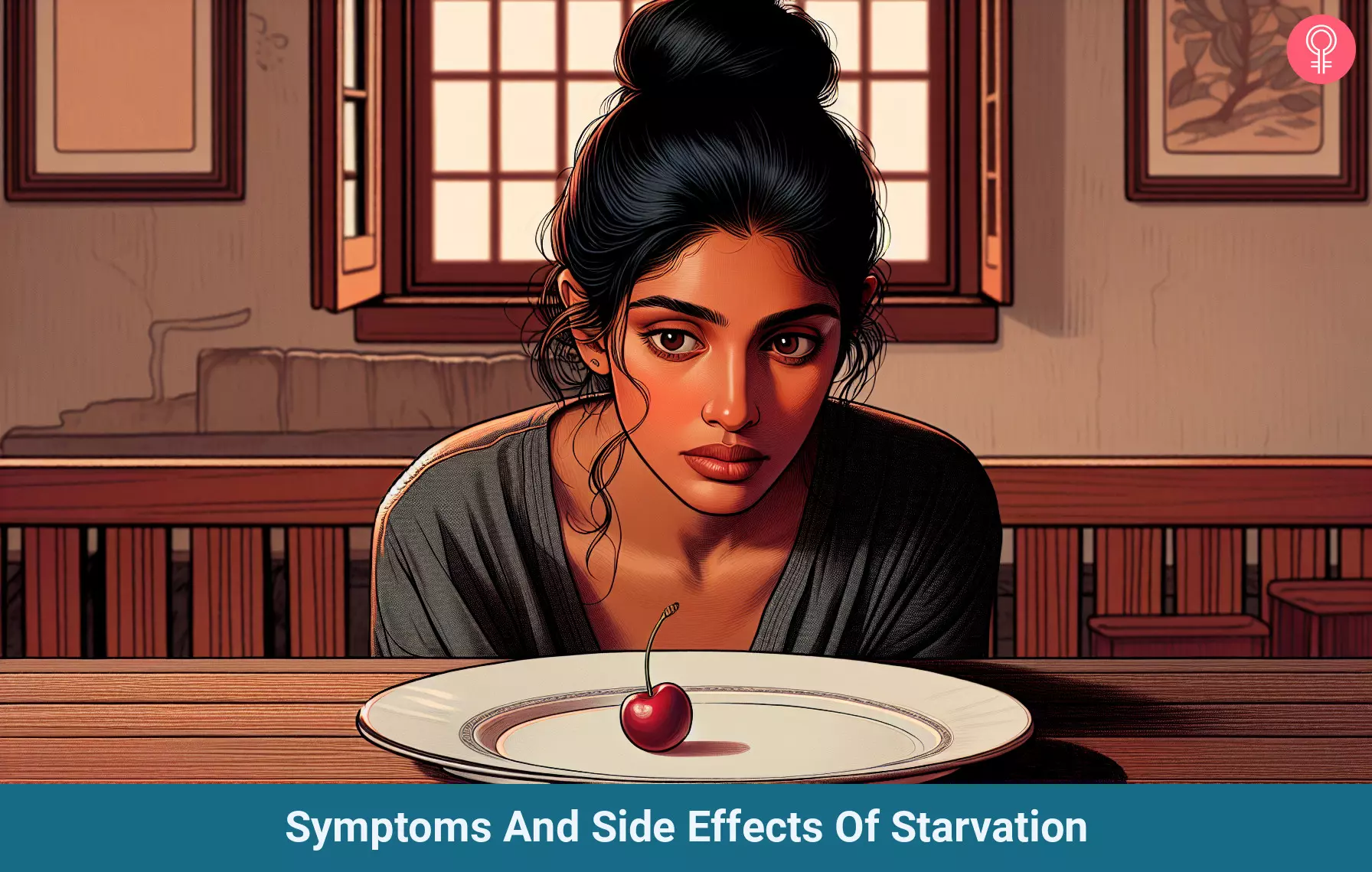What Are The Symptoms And Side Effects Of Starvation?
Refraining from eating can have serious adverse effects on your health and fitness goals.

Image: Shutterstock
There are many ways to lose weight. But starving is not one of them! There are serious health effects of starving yourself.
Reducing calorie intake may work for weight loss. But not eating anything or consuming negligible amounts of food can cause nutritional deficiencies. Self-inflicted starvation can also be attributed to a condition like anorexiai An eating disorder characterized by abnormally low body weight and extreme restriction on calorie intake. and may stem from body dysmorphia.
Not eating can also lead to severe malnutrition and may even permanently damage your organs, and bones, and lead to muscle wasting. Starving, in other words, can cause both physical and mental damage.
Read on to learn about the harmful side effects of starving yourself.
In This Article
Stages Of Starvation
Starvation progresses in different stages as the body faces a prolonged lack of sustenance.
The initial stage occurs when the body exhausts its immediate energy reserves, which include glycogen stored in the liver and muscles. The body then turns to fat stores for energy, which may result in significant weight loss (1).
Next, the body enters a state of ketosis. At this stage, it relies on ketones, produced by the breakdown of fats, as a primary source of energy. This can lead to muscle wasting and a decrease in metabolic rate to conserve energy (1).
In the final stage, the body moves into a catabolic stage. It breaks down its own tissues, including those of vital organs, to sustain crucial functions. This can result in organ failure and be fatal (1).

Each stage is marked by different symptoms. Learn more about them below.
Key Takeaways
- Starvation deprives you of essential dietary nutrients which may disturb physical and mental health.
- It may lead to malnutrition, fatigue, and depression.
- Prolonged starvation or anorexia may hamper your metabolism and lead to diabetes, low blood pressure, bone loss, and menstrual irregularities.
- Starvation can cause hair loss, skin dryness, and brittle nails.
- Starvation may also cause dehydration, which may lead to kidney problems and other health complications.
Symptoms Of Starvation
, Nutritionist and Holistic Health Coach, says, “Starving has drastic effects on your body. It destroys your muscles, bones, skin, and organs. Nutrient deficiencies lead to a weak immune system, and your body becomes susceptible to a number of diseases.”
She adds, “Long-term effects include chronic diseases like diabetes or heart disease. It also causes electrolyte disturbance resulting in weakness, tiredness, or sometimes even depression. In addition, it results in a slow heart rate and abnormally low blood pressure. In fact, starvation acts as an invitation to many diseases.”
The starvation symptoms vary from person to person. A 2017 study published in Nutrients, a journal of human nutrition, shared the development of the Starvation Symptoms Inventory (SSI), a questionnaire that assesses starvation symptoms in people with anorexia nervosa (2). Researchers tested the SSI on 150 patients with anorexia and various control groups. The results showed that the SSI is a reliable and accurate tool for identifying starvation symptoms, making it useful for understanding and managing eating disorders. The major symptoms reported are (2):
- Fatigue
- Abnormal attitude and behavioral changes toward food and eating
- Poor emotional and social functioning
- Poor concentration
- Fainting or dizziness
- Reduction in the rate of weight loss
- Poor concentration due to cognitive impairment
- Gastrointestinal discomfort (digestive problems)
- Cold intolerance
- Cardiac stress and drop in blood pressure
Starvation for a long period should not be encouraged as it may lead to several side effects.
What Are The Side Effects Of Starvation?
1. Malnutrition
According to the World Health Organization, malnutrition can be defined as deficiency, excess, or imbalances of specific nutrients
(3). This is perhaps the most damaging effect of voluntary or forced starvation. Starvation usually means that you don’t eat much at all. This leads to many essential nutrients and vitamins being excluded from your diet.
 Did You Know?
Did You Know?2. Dehydration

Lack of food for a long period slows down the body’s energy stores and poor nutrition, which is often related to dehydration.
This dehydration may, in turn, aggravate other problems and lead to cracked and exceedingly dry skin, lethargyi A state of lacking energy and being drowsy that can be alleviated by getting enough rest or sleep. , lack of urinary output, low or undetectable blood pressure, along with other conditions like constipation, among others (4).
Thus, it is important to remember to drink enough water, even if you are on a starvation diet. Starvation and dehydration depletes glycogen levels and disturbs electrolyte balance.
3. Decreases Resting Metabolic Rate
Starvation for a long period decreases metabolic ratei The number of calories you burn or are required to accomplish your body's needs over a specific period of time. as you are depriving your body of food and water, which almost exhausts its energy stores.
Chronic starvation decreases the resting metabolic rate, but the exact mechanism is still not understood well.
A 2013 study published in The Journal of Clinical Endocrinology and Metabolism investigated how chronic starvation in anorexia nervosa affects resting energy expenditure (REE) (5). Researchers compared the actual REE of 30 anorexia patients with predictions based on body composition. They found that the measured REE was significantly lower than expected. This suggests that starvation reduces the metabolic rate of fat-free mass (FFM). The study also noted that both organ and muscle mass were about 20% smaller in anorexia patients, indicating that the body adapts to starvation by reducing energy needs and mobilizing protein from organs and muscles (5).
4. Loss Of Monthly Menstrual Period

Starvation leads to many problems. One of these problems is it upsets how your periods are regulated. Those thinking about going on a starvation diet may want to consider the effects of hormonal imbalances on their health before beginning the diet.
The adipose tissue helps to produce female sex hormones by regulating the receptors (6). Due to prolonged starvation, your fat cells start to shrink. The lack of fat cells causes lack of estrogen, the female hormone (7). As prolonged starvation can lead to organ damage, the body processes tend to slow down, which usually causes menstruation to stop.
5. Constipation

Starvation can also induce constipation in many individuals.
Studies on many individuals with anorexia nervosa have shown that they may deal with severe starvation, which can lead to many disorders and requires the use of regular laxativesi A type of over-the-counter medicine that helps improve stool weight and consistency and increases bowel movements. to be treated wholly.
A case study on three women with severe anorexia found that they needed to use regular laxatives or enemas to help flush their colon. These women suffering from an eating disorder also ran a higher risk of rectal prolapsei A condition that occurs when the rectum becomes stretched out and slips outside the anus, the end of the digestive tract. due to the overuse of laxatives (8).
6. Bone Loss
A starved or starving individual may continue to lose weight at an alarming rate.
Although the changes in the skin and musculature are quite obvious, the bones also undergo developmental changes.
Christiana, a blogger, journaled how anorexia and starvation affected her bone health in her blog, Chrissy’s Kitchen. She states, “Lack of nutrients caused serious damage to my body. My estrogen level decreased and osteopenia set in. My bones became weakened and compromised. One day, while stretching before a dance class, my bones gave way. With a violent crunch, searing pain careened through my back. I had sustained a double back fracture to my spine (i).”
In both animal models and humans, prolonged starvation caused bone loss by stimulating osteoclast activity (bone cells break down), leading to loss of bone mineral density and decreased overall bone strength (9) leading to osteoporosis.
7. Fatigue

One of the most common side effects of starvation is fatigue. Starvation upsets the balance of essential vitamins in your body and slows down physiological processes, which can lead to fatigue and a feeling of lightheadedness.
8. Effects On Blood Pressure
Chronic starvation may lower blood pressure levels as your body is completely devoid of food and water.
A case study on a 17-year-old girl with anorexia showed very low blood pressure, which was very difficult to measure (10).
9. Electrolyte Imbalance
Starvation leads to electrolyte imbalance, which is mostly due to dehydration after prolonged fasting.
Studies on rats showed that starvation could lead to electrolyte imbalances, especially sodium, potassium, phosphorus, and calcium levels, which increased after refeeding them (11).
 Quick Tip
Quick Tip10. Affects The Brain

Prolonged starvation impairs brain function and exhausts all the glucose needed for the effective functioning of cognitive abilities.
A study on female mice showed that 48 hours of starvation markedly decreased brain glucose consumption and biochemical reactions associated with it (12).
11. Impacts The Mental Health
A study published in Biological Psychiatry (1988) examines the link between depression and starvation in 64 patients with anorexia nervosa or bulimia (13). Researchers found that lower body weight and higher levels of beta-hydroxybutyric acid were significantly associated with depressive symptoms like low mood. These findings suggest that the physical effects of starvation contribute to depression in individuals with eating disorders, even when accounting for the severity of the eating disorder itself (13). They might also have trouble focusing, feel lonely, and have a lower quality of life.
Starvation can also affect how you think. You might have trouble remembering things, making good decisions, and thinking clearly. In really bad cases, you might even see or hear things that are not there.
When you are starving, you might start to see your body in a bad way, resulting in body dysmorphia. You might be too critical of your appearance and feel ashamed of yourself. This can make you feel bad about yourself and have a negative body image.
If you are struggling with these feelings, it is important to talk to a mental health professional. They can help you cope with the emotional challenges of starvation.
There are other alternatives to help you lose weight and lead a healthier life that you can consider instead of intentionally starving yourself. Read the next section to learn more!
Alternatives For Maintaining A Balanced Diet
- Instead of skipping meals, consider portion control. Eat small, balanced meals throughout the day to maintain energy levels and metabolism.
- Incorporate fruits, vegetables, lean proteins, whole grains, and healthy fats to ensure you are getting all essential nutrients.
- Drink plenty of water to stay hydrated, aid digestion, and prevent dehydration-related complications.
- Steer away from processed and fatty foods and sugary or carbonated drinks.
- Consult with a registered dietitian or nutritionist to create a personalized meal plan that supports your health goals.
- Pay attention to hunger and fullness cues to avoid overeating or undereating.
- Regular exercise, combined with a balanced diet, can help you maintain a healthy weight range and improve overall well-being.
- Stay away from diets that demand extreme calorie restrictions or eliminate entire food groups.
- Engage in counseling or support groups if you struggle with body image issues or disordered eating behaviors.
Infographic: Most Damaging Effects Of Starving
Voluntary starving is never a healthy solution for losing weight. You may lose weight by not having food but it may cause serious health issues that can last a lifetime. Though we have listed all the damaging effects of starving in this article, you may check out the infographic below to know the most serious effects of starving that may lead to further health concerns. Illustration: StyleCraze Design Team
While various fad diets and types of fasting are common nowadays for weight loss, you should be wary of the effects of starving yourself. Knowing the signs to stop fasting is crucial, as prolonged starvation can lead to malnutrition, fatigue, electrolyte imbalance, and menstrual irregularities, and may even prove fatal if not addressed promptly. Underfeeding yourself may lead to irritability, anxiety and mental delusions, sometimes resulting in chronic depression as well. If you are aiming to lose some weight, make sure to consume small frequent meals and follow a healthy balanced diet.
Now that you know how starvation can adversely affect your body, we hope that you will rethink before going on those starvation diets. They are just a quick fix and offer little long-term benefits. Opt for a balanced regimen to lose weight.
Frequently Asked Questions
Does your stomach shrink when you starve?
Kristy Smith says, “No, it does not shrink your stomach. As you become an adult, the size of your stomach remains the same unless you go through surgery. Eating less helps you rest your appetite thermostat, so you don’t feel hungry and can follow up on your eating plans.”
What’s the difference between starving and intermittent fasting?
According to Kristy Smith, “Starving is defined as completely retaining yourself from eating food or eating very few calories for a longer period whereas intermittent fasting can be described as eating food within a specific time frame.”
She adds, “Another thing that differentiates between the two is the severity of the symptoms. People who are starving can develop brain dysfunction, heart failure, diabetes, etc. On the other hand, people who are fasting can experience mild symptoms like hunger, headache, dizziness, etc.”
Can starvation cause internal bleeding?
Starvation is not related to internal bleeding. Prolonged starvation may cause physical and mental damage.
Does your stomach shrink when you starve?
Starving for long can reduce the amount of food your stomach can accommodate.
Does intermittent fasting put you in the starvation mode?
Intermittent fasting is short-term fasting, which is restricted to a 16:8-hour window, followed by eating healthy food. On the other hand, complete fasting does not allow any food and water intake and is called metabolic damage or starvation mode.
Does starving yourself make you bloat?
Yes, starvation makes you bloat as you are not drinking water to digest the remaining food in your stomach.
Can your body reject food after starvation?
Refeeding syndrome can occur when a person resumes eating after starvation. This is due to the reintroduction of glucose or sugar. There may be abrupt changes in the electrolyte and fluid balance as the body processes meals once more. As a result of these changes, the condition can be lethal.
Illustration: Symptoms And Side Effects Of Starvation

Image: Dall·E/StyleCraze Design Team
Are you trying to starve yourself to lose weight? If yes, then watch this informative video to learn how a starvation diet can actually make you gain weight instead!
Personal Experience: Source
StyleCraze's articles are interwoven with authentic personal narratives that provide depth and resonance to our content. Below are the sources of the personal accounts referenced in this article.
i. MY ANOREXIA STORY;https://csbuckle.wordpress.com/my-anorexia-story/
References
Articles on StyleCraze are backed by verified information from peer-reviewed and academic research papers, reputed organizations, research institutions, and medical associations to ensure accuracy and relevance. Read our editorial policy to learn more.
- Why does starvation make bones fat?
https://www.ncbi.nlm.nih.gov/pmc/articles/PMC3169094/ - The Starvation Symptom Inventory: Development and Psychometric Properties, Nutrients, US National Library of Medicine, National Institutes of Health.
https://www.ncbi.nlm.nih.gov/pmc/articles/PMC5622727/ - What is malnutrition? World Health Organization.
https://www.who.int/news-room/questions-and-answers/item/malnutrition - Adult Dehydration
https://www.ncbi.nlm.nih.gov/books/NBK555956/ - Chronic Starvation Secondary to Anorexia Nervosa Is Associated With an Adaptive Suppression of Resting Energy Expenditure, The Journal of Clinical Endocrinology & Metabolism, US National Library of Medicine, National Institutes of Health.
https://www.ncbi.nlm.nih.gov/pmc/articles/PMC3942230/ - Adipose tissue as an endocrine organ, The Journal of Clinical Endocrinology & Metabolism, US National Library of Medicine, National Institutes of Health.
https://academic.oup.com/jcem/article/89/6/2548/2870285 - Types of reproductive disorders in underweight and overweight young females and correlations of respective hormonal changes with BMI, Iranian Journal of Reproductive Medicine, US National Library of Medicine, National Institutes of Health.
https://www.ncbi.nlm.nih.gov/pmc/articles/PMC4426152/ - Rectal prolapse associated with anorexia nervosa: a case report and review of the literature, Journal of eating Disorder, US National Library of Medicine, National Institutes of Health.
https://www.ncbi.nlm.nih.gov/pmc/articles/PMC4081793/ - Evidence for the Adverse Effect of Starvation on Bone Quality: A Review of the Literature, International Journal of Endocrinology, US National Library of Medicine, National Institutes of Health.
https://www.ncbi.nlm.nih.gov/pmc/articles/PMC4355339/ - Anorexia Nervosa: The physiological consequences of starvation and the need for primary prevention efforts, McGill Journal of Medicine, US National Library of Medicine, National Institutes of Health.
https://www.ncbi.nlm.nih.gov/pmc/articles/PMC2323541/ - Starvation and refeeding in rats: effect on some parameters of energy metabolism and electrolytes and changes of hepatic tissue, Pesquisa Veterinária Brasileira, Scientific Electronic Library Online.
https://www.scielo.br/j/pvb/a/3LgfNR5jVWPhBWvh8655C6s/?lang=en - Effect of starvation on brain glucose metabolism and F-2-fluoro-2-deoxyglucose uptake: an experimental in-vivo and ex-vivo study, EJNMMI research, U.S. National Library of Medicine, National Institutes of Health.
https://www.ncbi.nlm.nih.gov/pmc/articles/PMC5995768/ - Depression as a correlate of starvation in patients with eating disorders, Biological Psychiatry, U.S. National Library of Medicine, National Institutes of Health.
https://pubmed.ncbi.nlm.nih.gov/3370268/
Read full bio of Madhu Sharma
- Kristy Smith is a Certified Holistic Health Coach with 5 years of experience. She specializes in coaching and support for women undergoing IVF and pre-conception coaching. She is adept in hormonal health coaching, weight management, stress management, PCOS management, and nutritional counseling.
 Kristy Smith is a Certified Holistic Health Coach with 5 years of experience. She specializes in coaching and support for women undergoing IVF and pre-conception coaching. She is adept in hormonal health coaching, weight management, stress management, PCOS management, and nutritional counseling.
Kristy Smith is a Certified Holistic Health Coach with 5 years of experience. She specializes in coaching and support for women undergoing IVF and pre-conception coaching. She is adept in hormonal health coaching, weight management, stress management, PCOS management, and nutritional counseling.
Read full bio of Priyanka Sadhukhan
Read full bio of Arshiya Syeda
Read full bio of Moksha Gandhi



























Community Experiences
Join the conversation and become a part of our empowering community! Share your stories, experiences, and insights to connect with other beauty, lifestyle, and health enthusiasts.